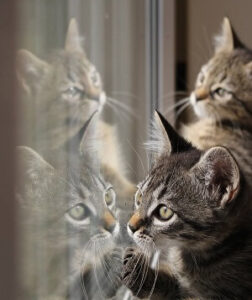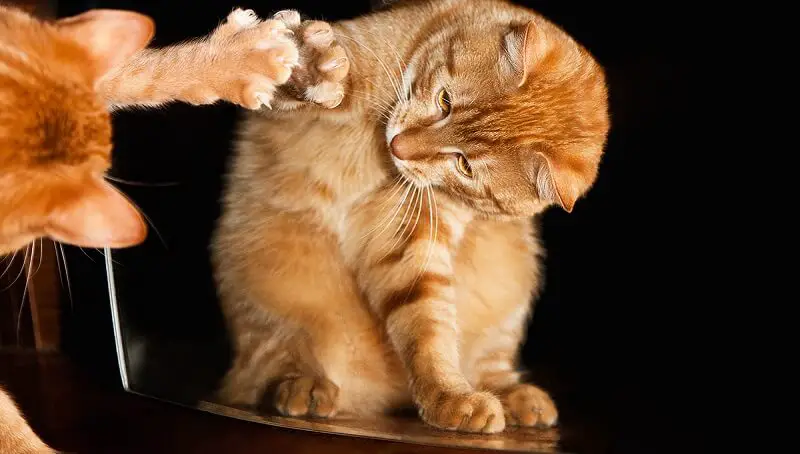It’s no secret that cats can be funny, which is one of the many reasons we love them so much. Cat’s strange behaviors can entertain us for hours, making us wonder why they do the things they do. One of the questions we ask ourselves is: Why does the cat scratch the mirror?
Here is a feline behavior that often makes cat owners curious. Although it rarely happens, the cat may compulsively scratch a mirror or reflective surface, waking its owners in the middle of the night. In this article I will try to make you understand why cats like to scratch the mirror and how can you stop this feline behavior.
Why does the cat scratch the mirror?
Cats will often scratch mirrors because they are naturally curious creatures. Scratching or touching with its paw is a good way for your cat to learn more about an object. Thus, the natural curiosity of cats and the unique properties of mirrors result in scratching the mirrors, through which the cat tries to understand more about the mirror and how it works.
The second reason for your cat’s behavior has to do with attention-seeking. The curiosity of your cat could easily turn into a fun game to play with you. If you pay attention to your cat every time she scratches the mirror, your cat will do this more often, as she will quickly learn that the mirror can actually be a good source of attention. All your cat needs to do is scratch and she will receive the attention of her master.
The final reason has to do with reflection. Some cats may not recognize their own reflection and therefore think that the reflection is another cat. In some cases, cats may see their reflection as an intruder. So, your cat will defend her territory by scratching the “intruder”.
You might also like my articles about:
- How to clip a cat’s nails without getting scratched
- Why does my cat eat sand from the litter box
- Why are cats walking low to the ground and meowing
Is it dangerous for a cat to scratch the mirror?
 In most situations, scratching the mirror is not a dangerous behavior. In fact, cats can outperform this behavior as they age. Over time, they may get used to seeing their reflection, making them not as disturbed by it.
In most situations, scratching the mirror is not a dangerous behavior. In fact, cats can outperform this behavior as they age. Over time, they may get used to seeing their reflection, making them not as disturbed by it.
However, there are some concerns about safety. A possible danger is that the mirror will fall. The cat could get injured and some damage could occur in the house. It is possible for your cat to get hurt if she aggressively scratches the mirror. Cat nails are not designed to cut glass, so there is a risk that they will crack or break if scratching is excessive.
In some cases, mirrors can become a constant source of anxiety or aggression, especially if your cat is a tomcat and he continues to see his reflection as a threat. In rare cases, the cat may develop a compulsive disorder, causing it to aggressively attack any reflective surface.
How can you prevent your cat from scratching the mirror?
There are several steps you can take to stop cats from scratching mirrors. For example, you can enrich the environment to stimulate your cat. Place scratch trees, puzzle-feeding toys, puzzle feeders, and nourishing slow-release food. These are all great ways to feed your cat’s curiosity.
Another strategy is to discourage this behavior. This can be done by spraying your cat with water whenever it starts to scratch the mirror. Pretty fast, your cat will associate the mirror with the spray, causing it to switch to other things to explore. Or you can discourage your cat from approaching mirrors by putting double-sided tape or sandpaper in front of the mirror, where your cat would usually stand to scratch.
One last strategy would be to cover the mirrors so that your cat won’t be able to see her reflection. After a while you can reintroduce them into your cat’s life, discovering one mirror at a time.
Unfortunately, in some severe cases related to this behavior, your cat may need anti-anxiety medications. If the behavior persists and you become worried about your cat, you should contact your veterinarian as he or she may perform blood tests and other additional diagnostic tests.
Final Words!
Kittens and cats should keep their claws in shape and must scratch in order to keep them healthy. The trick is to redirect their attention from furniture and other objects to surfaces more suitable for sharpening their claws. The key is to teach your cat to avoid areas that can be destroyed.
Always play with your cat every day. Extra quality time can be useful for stopping bad behavior. Disobedient cats can also be bored, so you need to give them stimulation and exercise.
Finally, praise the cat when it behaves properly. Use kind words, gentle caresses, and tasty treats to strengthen good behavior.




